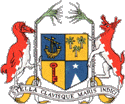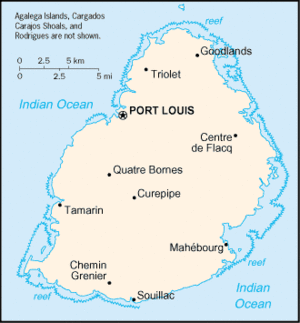Mauritius
|
|
The Republic of Mauritius is an island country in the southwest Indian Ocean, about 900 km east of Madagascar. In addition to the island of Mauritius, the republic includes the islands of St. Brandon and Rodrigues and the Agalega Islands. Mauritius is part of the Mascarene Islands, with the French island of Réunion 200 km to the southwest.
"First God made Mauritius, then he copied it and made Paradise." -- Rudyard Kipling
| ||||
| National motto: Stella Clavisque Maris Indici (Latin: Star and Key of the Indian Ocean)</font> | ||||

| ||||
| Official languages | De facto: English, French and Creole | |||
| Capital | Port Louis | |||
| President | Sir Anerood Jugnauth | |||
| Prime Minister | Paul Bérenger | |||
| Area - Total - % water | Ranked 168th 1,860 km² 0.05% | |||
| Population - Total (2002) - Density | Ranked 149th 1,189,825 588/km² | |||
| Independence - Date | From the United Kingdom March 12, 1968 | |||
| Currency | Mauritian Rupee | |||
| Time zone | UTC +4 | |||
| National anthem | Motherland | |||
| Internet TLD | .mu | |||
| Calling Code | 230 | |||
| Contents |
History
Main article: History of Mauritius
The island was discovered by the Portuguese in 1505, and first colonised by the Dutch in 1638, naming the island in honour of Prince Maurice of Nassau. The French controlled the island during the 18th century and renamed it Ile de France. The island was taken over by the British in 1810 and reverted to its former name.
Independence was attained in 1968, with the country becoming a republic within the Commonwealth in 1992. Mauritius has been a stable democracy with regular free elections and a positive human rights record, and has attracted considerable foreign investment earning one of Africa's highest per capita incomes.
Politics
Main article: Politics of Mauritius
The head of state of Mauritius is the president, who is elected for a five-year term by the National Assembly, the unicameral Mauritian parliament. The National Assembly consists of 62 members elected directly by popular vote, while between 4 and 8 further members are appointed from "best losers" election candidates to represent ethnic minorities, depending on the results of the election. The government is headed by the prime minister and a council of ministers.
General elections will take place on the 3rd of July 2005 in all the 20 constituencies of the country. Results are expected to be available the next day.
Historically, elections have always adhered to a two-party system in Mauritius and this will be the case also this time, with the currently in-power MSM/MMM/PMSD coalition against the PTr-led Alliance Sociale.
Districts and dependencies
Main article: Districts and dependencies of Mauritius
The island of Mauritius itself is divided into 9 districts:
- Black River
- Flacq
- Grand Port
- Moka
- Pamplemousses
- Plaines Wilhems
- Port Louis
- Riviere du Rempart
- Savanne
Three islands or island groups also belonging to Mauritius are dependencies:
Note: Mauritius also claims the French-owned Tromelin Island and the Chagos Archipelago (British Indian Ocean Territory).
A number shallow banks also belong to Mauritius, such as:
- Soudan Banks (including East Soudan Bank)
- Nazareth Bank
Note: Mauritius also claims the Saya de Malha Bank as part of its exclusive economic zone and falls into Mauritian Territorial Waters
Geography
Main article: Geography of Mauritius
Together with Réunion and Rodrigues, Mauritius is part of the Mascarene Islands. This archipelago was formed in a series of undersea volcanic eruptions, as the African plate drifted over the Réunion hotspot. Mauritius and Rodrigues were formed 8-10 million years ago. They are no longer volcanically active, and the hotspot now rests under Réunion. The island of Mauritius itself is formed around a central plateau, with its highest peak in the southwest, Piton de la Riviere Noire at 828 m. Around the plateau, the original crater can still be distinguished from several mountains.
The local climate is tropical, modified by southeast trade winds; there is a warm, dry winter from May to November and a hot, wet, and humid summer from November to May. Cyclones affect the country during November-April.
The island's capital and largest city is Port Louis, in the northwest. Other important towns are Curepipe, Rose Hill, Quatre Bornes and Vacoas, and the Triolet Village.
Economy
Main article: Economy of Mauritius
Since independence in 1968, Mauritius has developed from a low-income, agriculturally based economy to a middle income diversified economy with growing industrial, financial, and tourist sectors. For most of the period, annual growth has been of the order of 5% to 6%. This remarkable achievement has been reflected in increased life expectancy, lowered infant mortality and a much improved infrastructure.
Sugar cane is grown on about 90% of the cultivated land area and accounts for 25% of export earnings. However, a record-setting drought severely damaged the sugar crop in 1999. The government's development strategy centres on foreign investment. Mauritius has attracted more than 9,000 offshore entities; many aimed at commerce in India and South Africa while investment in the banking sector alone has reached over USD 1 billion. Economic performance during the period from 2000 through 2004 combined strong economic growth with unemployment at 7.6% in December 2004.
On the 4th of April 2005 during his budget speech (http://mof.gov.mu/budget/20052006/speech.htm), Hon. Pravind Jugnauth, Deputy Prime Minister and Minister of Finance and Economic Development announced that Mauritius will become a Duty Free Island and that will take about 4 years. Duty has been decreased (and for many products completely eliminated) for more than 1850 products including clothing, food, jewellery, photographic equipment, audio visual equipment, lighting equipment etc.
The main motivations are (1) Attract more tourists going to Singapore and Dubai, and, (2) Give all Mauritians easier access to quality products at affordable prices.
A plan by ADB Networks calls for Mauritius to become the first nation to have coast-to-coast wireless internet access. The wireless "hot spot" currently covers about 60% of the island and is accessible by about 70% of its population. By year's end antennas should provide access to 90% of the island.
Demographics
Main article: Demographics of Mauritius
The two official languages of Mauritius are English and French, of which French is the still the most widely spoken despite France having lost its colonial dominion over the island nearly 200 years ago. A French-derived Creole language, with influence from English and Portuguese, is widely spoken on the Island. Hindi is also used by the minority Mauritians. Several Asian languages, including Hindi and other Indian languages such as Tamil, Telugu, Marathi, Bhojpuri and Gujarati are also spoken, but only by the smallest minorities on the island.
The latter South Asian languages are spoken by descendants of the labourers brought from India during the British rule. These Indo-Mauritians form approximately 60% of the total population, while the rest of the population are of either Africa, French, Chinese or mixed descent. There are approximately 30 000 Mauritians of Chinese descent, from Hakka, Mandarin and Cantonese language groups.
Of all religiously affiliated Mauritians, Hindus constitute 50% while the remainder is composed mostly of Christians(28%) and Muslims (17%).
Culture
Main article: Culture of Mauritius
The mixed colonial past of Mauritius is reflected in its culture. For example, the cuisine of Mauritius is a blend of Dutch, French, Indian and Creole.
In 1847 Mauritius became the fifth country in the world to issue postage stamps. The two types of stamps issued then, known as the Red Penny and the Blue Penny are probably the most famous stamps in the world, being very rare and therefore also very expensive.
When discovered, the island of Mauritius was home to a previously unknown species of bird, which the Portuguese named the dodo (simpleton), as they appeared not too bright. However, by 1681, all dodos had been killed by settlers or their domesticated animals. Nevertheless, the dodo is prominently featured as a supporter of the national coat-of-arms (see above).
Miscellaneous topics
- University of Technology, Mauritius
- List of Mauritians
- Communications in Mauritius
- Transportation in Mauritius
- Military of Mauritius
- Foreign relations of Mauritius
- Tertiary education in Mauritius
Further Reading
- Dodd, Jan and Madeleine Philippe. Lonely Planet Mauritius Reunion & Seychelles (http://www.amazon.com/exec/obidos/redirect?link_code=ur2&camp=1789&tag=averyws-20&creative=9325&path=tg/detail/-/1740593014/qid=1119373256/sr=1-2/ref=sr_1_2?v=glance%26s=books). (Lonely Planet Publications, 2004). I booked a tour to Mauritius in May-June 2004. Although I went with a travel agency, this book proved to be indispensable.
- Globetrotter. Mauritius Travel Map (http://www.amazon.com/exec/obidos/redirect?link_code=ur2&camp=1789&tag=averyws-20&creative=9325&path=tg/detail/-/1843300249/qid=1119373256/sr=1-3/ref=sr_1_3?v=glance%26s=books). (New Holland Publishers, 2002). Globetrotter maps to help you find your way around Mauritius.
- O'Brian, Patrick. The Mauritius Command (http://www.amazon.com/exec/obidos/redirect?link_code=ur2&camp=1789&tag=averyws-20&creative=9325&path=tg/detail/-/039330762X/qid=1119373256/sr=1-1/ref=sr_1_1?v=glance%26s=books). (New York: William Collins Sons & Co., 1977). This novel is superb being set in an area with which most readers will be utterly unfamiliar, Mauritius.
External links
Template:Portal Template:Commonscat Template:Wiktionary
Government
- Government of Mauritius (http://www.gov.mu/) official government site
News
- allAfrica.com - Mauritius (http://allafrica.com/mauritius/) news headline links
- Mauritius broadcasting Corp. (http://mbc.intnet.mu/) - Public TV/Radio Broadcasting
Directories
- LookSmart - Mauritius (http://search.looksmart.com/p/browse/us1/us317916/us559898/us559899/us10065675/us559935/) directory category
- Open Directory Project - Mauritius (http://search.looksmart.com/p/browse/us1/us317916/us559898/us559899/us10065675/us559935/) directory category
- Yahoo - Mauritius (http://dir.yahoo.com/Regional/Countries/Mauritius/) directory category
Tourism
- Template:Wikitravel
- Mauritius Tourism Promotion Authority (http://www.mauritius.net/) official tourism site
Other
- Servihoo web portal (http://www.servihoo.com/) - Mauritian portal
- Mauritius Info (http://www.mauritius-info.com/) - Mauritian portal
- University of Mauritius (http://www.uom.ac.mu/)
- University of Technology, Mauritius (http://www.utm.ac.mu/)
- TopFm Radio (http://www.topfmradio.com/) - Live, local, Mauritian radio station
- The Dutch in Mauritius (http://www.colonialvoyage.com/mauritius.html) The Dutch in Mauritius
- Pre-Mauritius Banknotes (http://numismondo.com/pm/ifb/) - 18th Century Banknotes from Isles de France et de Bourbon
| Countries in Africa | ||
|
Algeria | Angola | Benin | Botswana | Burkina Faso | Burundi | Cameroon | Cape Verde | Central African Republic | Chad | Comoros | Democratic Republic of the Congo | Republic of the Congo | Côte d'Ivoire | Djibouti | Egypt | Equatorial Guinea | Eritrea | Ethiopia | Gabon | The Gambia | Ghana | Guinea | Guinea-Bissau | Kenya | Lesotho | Liberia | Libya | Madagascar | Malawi | Mali | Mauritania | Mauritius | Morocco | Mozambique | Namibia | Niger | Nigeria | Rwanda | São Tomé and Príncipe | Senegal | Seychelles | Sierra Leone | Somalia | Somaliland | South Africa | Sudan | Swaziland | Tanzania | Togo | Tunisia | Uganda | Zambia | Zimbabwe | Western Sahara | ||
| Dependencies: Canary Islands | Ceuta and Melilla | Madeira Islands | Mayotte | Réunion | Saint Helena and dependencies | ||
ca:Maurici de:Mauritius et:Mauritius es:Mauricio fa:موریس eo:Maŭricio, Afriko fr:Île Maurice he:מאוריציוס id:Mauritius io:Maurico it:Mauritius ja:モーリシャス ko:모리셔스 lt:Mauricijus ms:Mauritius nds:Mauritius nl:Mauritius no:Mauritius pl:Mauritius pt:Maurícia ru:Маврикий sr:Маурицијус sa:मारिशस sl:Mauritius fi:Mauritius sv:Mauritius zh:毛里求斯


